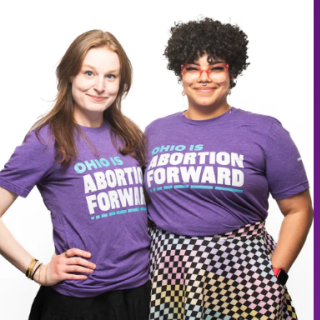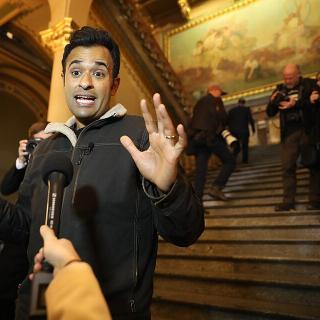This article first appeared in the Buckeye Flame
As one of the fastest growing cities in the country, Columbus is in for major changes in the coming years—and local queer community leader Densil Porteous wants to be a part of the conversation to fill the vacant District 7 representative on city council.
“We know we are going to continue to grow, and we have to be thoughtful, strategic and intentional about that growth,” he said.
As a queer Black man, a parent and a two-decade Columbus resident, Porteous believes he will bring a much-needed perspective to Council to ensure a bright and equitable future for the city. His platform is centered on affordable housing, inclusive economic growth, environmental justice and community-centered safety solutions.
“These are the topics we need to keep in mind as we continue to grow, rather than specific policies or initiatives,” he said, adding that open dialogue with citizens, local officials and other community stakeholders must happen first to determine the best path forward, legislatively.
Porteous was named on December 13 as one of the ten finalists for the open council position. The public is invited to participate in a hearing on Wednesday, December 18, 2024, at 5 p.m., in City Council Chambers at City Hall. During this hearing, residents will have the opportunity to share their thoughts on all ten finalists.
No matter who is appointed to fill the council vacancy, Porteous announced his commitment to the 2025 race for the District 7 seat.
“Regardless of this moment’s outcome, I will run to serve District 7 in the upcoming election. My dedication to this community and its future is unwavering.”
The Buckeye Flame spoke with Porteous about his decision to run and his vision for Columbus’s future.
What led you to launch a city council bid at this point?Densil Porteous: Coming out of this presidential election and seeing how divided our communities are, I thought it was time to step up. All the intersections of my identity—thinking about queer folks, Black folks, those who are parents or naturalized citizens—came into play as I considered this opportunity. Our communities are not going to stop growing. It’s an exciting moment to throw my hat in the ring for a city that I love and that I’m so thankful for and that has helped me grow and blossom into the person I am today. I want to give back as much as I possibly can.
 Tell us a bit about your background and how you feel it will inform your approach to governance.
Tell us a bit about your background and how you feel it will inform your approach to governance.Advocates for Youth in Washington, DC, was the first organization I stepped into. I started as a young person using their resources and I grew to become a peer resource person, and then I stepped onto the board. I’ve also been heavily active in the Human Rights Campaign, the country’s largest LGBTQ+ rights organization. I started as a volunteer with HRC helping raise funds for their national dinners and being a volunteer at their Pride events and booths, then stepped onto the steering committee locally in San Francisco. Now I am on the national board of directors. And I’m active locally in Columbus, as well.
These experiences have taught me that advocacy is about connecting information and resources to the people who need it. I think governance is similar. You want to govern as much to the center as possible because you want to make sure you’re representing everyone. Not everyone experiences the world the way I do, so it’s important to find common ground between all the parties involved—whether that be liberal or conservative, middle to upper income or lower income community, life-long Columbus residents and those new to the region and the dichotomies of community go on.
Your platform centers on affordable housing, economic inclusion, environmental justice, and community safety – can you give us a glimpse of the specific policies you have in mind to achieve the goals of your platform?For me, it really is about bringing these topics to the fore of the conversation. There may be some policies that come down the line once I’m elected that I can say, okay, here’s what we can do in a more concrete fashion. As the thirteenth largest metro area in the country, we know we are going to continue to grow. My focus now is on making sure we’re thinking strategically about that growth and not necessarily bringing forth set policies that have been baking in my mind. Council is about listening to your community and understanding the needs of the citizens you represent.
Are there any recent acts of council that you can point to as an example of this is what we should be doing—or shouldn’t?Investment in public transit is something I feel council has handled well to anticipate the future. I had the great opportunity of growing up in New York and living in San Francisco and traveling the country and seeing places where they have robust transit lines, and it’s exciting to think that in 15–20 years Columbus could have similar services.
Another policy I look forward to seeing take effect is the city’s recent redistricting. City council members are now required to live in the district they represent. I’m all about representation, and as someone who has lived in what is now District 7 for more than 20 years, I feel my dedication to my local community will be far greater than someone who may just relocate to the district to run for office.
Columbus has a perfect score in the Human Rights Campaign’s municipality equality index, yet so does Cincinnati, where local government has gone further legislatively to support the LGBTQ+ community in recent years, such as by declaring the city a safe haven for gender-affirming healthcare and allocating $500,000 to trans youth mental health services. Given this, do you feel that Columbus has earned its perfect HRC score, and how will you as a council member work to improve the city’s support of the LGBTQ+ community?I commend Columbus for once again receiving a 100% rating. Every year HRC raises the bar just a little bit more, and Columbus consistently meets the mark, but there is much more we as a city can do, and we can look to Cincinnati and even Cleveland for inspiration. I’m always going to be that champion ensuring that members of our LGBTQ+ community are seen and thriving. I’m always going to be the one to ask questions. Why haven’t we done this? Why can’t we do this? And then listen.
For me it’ll be an opportunity to understand what challenges may be within the city or its government that has disallowed our council members from feeling like they could push further or push harder on LGBTQ+ equality.



